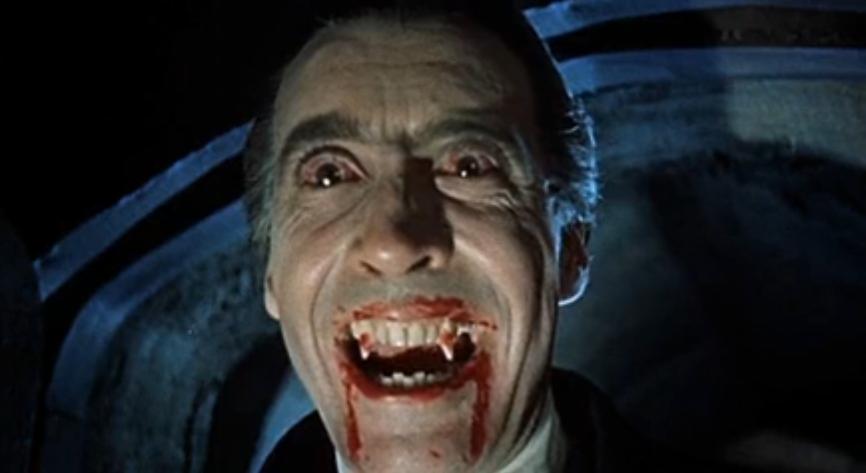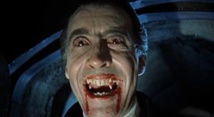Lee died in his home city of London on Sunday, the local authority which issued his death certificate said.
According to The Daily Telegraph newspaper, he died in hospital, where he had been treated for respiratory problems and heart failure over the preceding three weeks.
The Hammer films opposite Peter Cushing in the 1950s launched Lee's movie career, and although he later expressed frustration at being typecast, he entrenched his image by playing a succession of exotic villains.
"They're more interesting, because there's a greater variety you can apply: you can be very cruel or charming, amusing or dangerous," Lee said.
However, he criticised the gratuitous violence of many modern films, arguing the power of suggestion was more terrifying -- something he mastered early on, scaring the wits out of viewers with his piercing gaze.
Lee was recognised for his achievements with a knighthood in 2009, when he admitted his pleasure in a long career.
"What's really important for me is, as an old man, I'm known by my own generation and the next generation know me too," he said.
Lee also had a sideline as a heavy metal singer. His last album, "Metal Knight", was released on his 92nd birthday, followed by a hard-rocking Christmas carol in 2014.
Lee's "Lord of the Rings" co-stars led the tributes, with Elijah Wood, who played Frodo Baggins, calling him "an icon and a towering human being".
Director Tim Burton told BBC news that Lee had "inspired an entire generation of film-makers".
Roger Moore, who played 007 opposite Lee's villainously brilliant Scaramanga in the 1974 James Bond movie "The Man With the Golden Gun", said they had first met in 1948.
"It's terrible when you lose an old friend, and Christopher Lee was one of my oldest," he said.
Prime Minister David Cameron described him on Twitter as "a titan of the golden age of cinema and a distinguished WW2 veteran who'll be greatly missed".
- 'Making cult movies' -
Lee was born in London on May 27, 1922, to a decorated army colonel and an Italian countess, and attended the elite schools of Eton and Westminster.
He served in the Royal Air Force in World War II, at one point being attached to the special forces.
After the war, Lee had bit parts in film, theatre and radio, although at six feet four inches (1.95 metres), he said he suffered from being "too tall and too foreign-looking".
His big break came when he signed with Britain's legendary Hammer studios to make "The Curse of Frankenstein" in 1957.
He and Cushing went on to make cinematic history with a variety of sinister tales, including "Dracula" (1958), "The Mummy" (1959) and "The Hound of the Baskervilles" (1959).
Lee later returned to the Hammer brand opposite Hollywood actress Hilary Swank in thriller "The Resident" (2010).
Other memorable films included the Fu Manchu series and the terrifying 1973 movie "The Wicker Man" with Edward Woodward, one of the great cult films of all time.
"That's the story of my career really, making cult movies," Lee once said.
In a rare break from type, Lee hosted a one-off episode of US television show "Saturday Night Live" in 1978, which he said he had relished because it showed he could be funny.
- 2000s career revival -
Lee considered his portrayal of Pakistan's founder Mohammed Ali Jinnah in the little-seen "Jinnah" (1998) as his "best performance, no question".
But for many young fans he will be best known as Count Dooku in the "Star Wars" prequels and as Saruman in the films based on J. R. R. Tolkien's "The Lord of the Rings" and "The Hobbit".
As Saruman, Lee used his voice and steely gaze to maximum effect as the wizard corrupted by power.
Lee married former Danish model Gitte Kroencke in 1961 and had one daughter, Christina.
-----------------------------------------------------------------------------------------------------------------------------
According to The Daily Telegraph newspaper, he died in hospital, where he had been treated for respiratory problems and heart failure over the preceding three weeks.
The Hammer films opposite Peter Cushing in the 1950s launched Lee's movie career, and although he later expressed frustration at being typecast, he entrenched his image by playing a succession of exotic villains.
"They're more interesting, because there's a greater variety you can apply: you can be very cruel or charming, amusing or dangerous," Lee said.
However, he criticised the gratuitous violence of many modern films, arguing the power of suggestion was more terrifying -- something he mastered early on, scaring the wits out of viewers with his piercing gaze.
Lee was recognised for his achievements with a knighthood in 2009, when he admitted his pleasure in a long career.
"What's really important for me is, as an old man, I'm known by my own generation and the next generation know me too," he said.
Lee also had a sideline as a heavy metal singer. His last album, "Metal Knight", was released on his 92nd birthday, followed by a hard-rocking Christmas carol in 2014.
Lee's "Lord of the Rings" co-stars led the tributes, with Elijah Wood, who played Frodo Baggins, calling him "an icon and a towering human being".
Director Tim Burton told BBC news that Lee had "inspired an entire generation of film-makers".
Roger Moore, who played 007 opposite Lee's villainously brilliant Scaramanga in the 1974 James Bond movie "The Man With the Golden Gun", said they had first met in 1948.
"It's terrible when you lose an old friend, and Christopher Lee was one of my oldest," he said.
Prime Minister David Cameron described him on Twitter as "a titan of the golden age of cinema and a distinguished WW2 veteran who'll be greatly missed".
- 'Making cult movies' -
Lee was born in London on May 27, 1922, to a decorated army colonel and an Italian countess, and attended the elite schools of Eton and Westminster.
He served in the Royal Air Force in World War II, at one point being attached to the special forces.
After the war, Lee had bit parts in film, theatre and radio, although at six feet four inches (1.95 metres), he said he suffered from being "too tall and too foreign-looking".
His big break came when he signed with Britain's legendary Hammer studios to make "The Curse of Frankenstein" in 1957.
He and Cushing went on to make cinematic history with a variety of sinister tales, including "Dracula" (1958), "The Mummy" (1959) and "The Hound of the Baskervilles" (1959).
Lee later returned to the Hammer brand opposite Hollywood actress Hilary Swank in thriller "The Resident" (2010).
Other memorable films included the Fu Manchu series and the terrifying 1973 movie "The Wicker Man" with Edward Woodward, one of the great cult films of all time.
"That's the story of my career really, making cult movies," Lee once said.
In a rare break from type, Lee hosted a one-off episode of US television show "Saturday Night Live" in 1978, which he said he had relished because it showed he could be funny.
- 2000s career revival -
Lee considered his portrayal of Pakistan's founder Mohammed Ali Jinnah in the little-seen "Jinnah" (1998) as his "best performance, no question".
But for many young fans he will be best known as Count Dooku in the "Star Wars" prequels and as Saruman in the films based on J. R. R. Tolkien's "The Lord of the Rings" and "The Hobbit".
As Saruman, Lee used his voice and steely gaze to maximum effect as the wizard corrupted by power.
Lee married former Danish model Gitte Kroencke in 1961 and had one daughter, Christina.
-----------------------------------------------------------------------------------------------------------------------------









 Home
Home Politics
Politics











